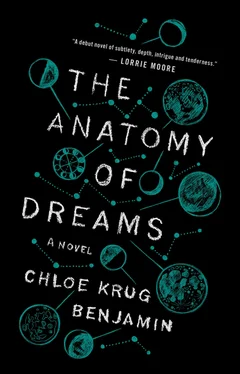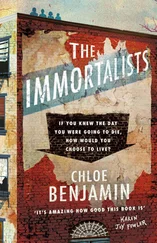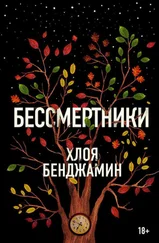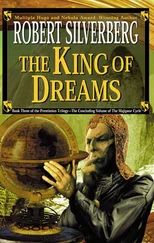“Meredith?”
“His wife. She died, for Chrissake, and young—how are you supposed to get over that?”
That night, I lay awake for hours in the bed that Gabe and I had shyly begun to share. Meredith: the name sounded familiar, but I couldn’t place it. Gabe was snoring beside me, a peaceful mound. I climbed out of bed and started up the computer, waiting as it sputtered and groaned. I pulled up Google and searched for some combination of Meredith and Keller. Why I felt the need to do so privately I wasn’t sure; I only knew that I was betraying Keller, and somehow, Gabe, too.
What came up was the 1993 obituaries page of the Vineyard Gazette . I had to scroll down through a long list of other names—“Mary Lu Jensen, 78, Cared Lovingly for People, Plants”; “Kenneth Bryors, 94, Enjoyed Island Life, Family Visits”—before I found hers.
RENOWNED SCIENTIST AND PROFESSOR MEREDITH KELLER DEAD AT 43
A graveside service at Crossways Cemetery will be held on Saturday, December 4, to honor the life of Meredith Keller, née Meredith White. Born in 1950 to Mary and Lewis White in Oak Bluffs, Meredith received her MA in psychology at the University of Tennessee and her PhD in neurobiology at Yale School of Medicine. Shortly after graduating, Meredith became a teacher in the US military school system, educating children in Vietnam, Germany and Japan before accepting an assistant professorship at the University of San Francisco in 1979. It was there that she met her husband, researcher Adrian Keller, a PhD student who later joined Meredith on the faculty. They were married in 1985.
Meredith took her own life on November 26, 1993. She is survived by her widower, Adrian Keller, and her mother, Mary White. She had no children.
Donations in her memory may be made to the Meredith Keller Foundation for Interactive Lucid Dreaming through the philosophy-neuroscience-psychology program at the University of San Francisco.
“You don’t find that a little unethical?” I demanded of Gabe the next morning. As surreptitiously as I had found the information, I couldn’t keep quiet now that I had it. “I mean, Jesus—Keller’s wife commits suicide, and he funnels all of her donations into his own research?”
“The research was both of theirs,” said Gabe. His face was rigid with a defensiveness that surprised me. “They were partners.”
“I thought you said you didn’t know anything about her,” I said. “Nothing but the fact that she died.”
“I knew they were colleagues.”
“Hardly,” I said. “He was her student.”
Gabe paused in surprise.
“How do you know that?” he asked.
I had put it together that morning, lying in bed as the perimeter of our eclipse curtains glowed with apricot light. The letter tucked in Jung’s Memories, Dreams, Reflections —the three delicate pieces of paper, falling to the floor as if in invitation. Who were you writing to? I’d asked. My thesis adviser , he’d said. Meredith.
“He told me.”
“Why?” asked Gabe. “In what context?”
He was standing across from me in the bedroom, his chest lifted in a proud sort of hurt.
“I found a letter he wrote her. I stumbled upon it in the library at Snake Hollow, and I asked him who it was for.”
“That’s a little invasive, don’t you think?”
“Maybe he wanted me to see it.”
“What do you mean by that?” He looked genuinely bewildered.
“Nothing,” I said.
I felt ashamed; I had scribbled too far outside of the lines. What did I know of Keller’s life, his marriage? I had never lost someone I loved. But the realization that I’d learned something of Keller that Gabe didn’t know made me uneasy. I still had the nagging feeling that I had not discovered the letter to Meredith and the details of her death entirely of my own accord. I even realized that the photograph above her obituary was the same one I had found in Keller’s bedroom, which could have been a coincidence but still gave me the eerie sense that I had unintentionally connected two dots. And although I found this impossible to prove—how could Keller have known I would search for a second copy of Jung’s book or that I would care to find out more about his wife?—I still felt like I was following a path that someone else had set out before me.
Perhaps that’s why I stepped off of the path entirely—or maybe I turned around and started walking the other way. Whether it was in fear or revolt, I didn’t want to know more than I already did. I wanted to believe that I could choose not to learn more about Meredith. I would accept the ground I was standing on; I didn’t always have to search for cracks. If knowledge was an offering, from Keller or somebody else, all I had to do was decline it.
15. MADISON, WISCONSIN, 2005
There were times, of course, when it was impossible to avoid Janna and Thom. We bumped into them at the movie rental place, Janna clutching a silent film, or we saw Thom on campus—Gabe and I grabbing lunch during a daytime shift at the sleep lab, Thom running across the street with his gazelle’s legs just as the light turned red. Each time, my reaction to Thom was visceral, equal parts magnetism and repulsion. Gabe watched me; how couldn’t he? I tried to seem unconcerned. But that shift was seismic, governed by laws outside my control, with a lure as powerful and bewildering as déjà vu.
One sleepy, sunny morning at the beginning of February, the phone rang while Gabe and I ate breakfast—hard-boiled eggs with a piece of fruit on the side. Gabe nodded at me with half an egg in his mouth.
“You gonna get it?”
“Let’s not,” I said.
There was a cut-open blood orange on each of our plates. Several days ago, we returned from the market with a bag of the swollen, thick-skinned fruit. Each was so juicy it dyed our napkins purple.
How was it possible that the phone was still ringing? Gabe paused with his fork in the air.
“It could be Keller,” he said.
“He’ll leave a message.”
Gabe pushed his chair back and wiped his hands on his pants, which stained.
“There’s no need,” he muttered, crossing the room, “to play games. Might as well find out what he wants.”
But before he could pick up the receiver, the ringing stopped, and there was a sharp rapping noise at the door.
“Jesus,” I said. “Can’t leave us alone for one morning, can he?”
I salted my last egg as Gabe strode to the door. I was already sick of the fleshy whites, their Jell-O texture.
“Thom,” said Gabe.
The sound of his name made me want to run. I was ashamed of myself; I had done harder things than this. But I waited at the kitchen table while Gabe and Thom conferred outside, hoping that Thom had only come with a quick question about road closures.
There was a jagged peak of a laugh—Janna’s.
“Sounds like fun,” said Gabe.
He let the door swing open. Thom and Janna stood in their winter regalia: Thom in a long houndstooth overcoat, Janna in a satiny turquoise jacket. Its exaggerated, stand-up collar rose as high as her nose.
“Bocce,” said Gabe. “Want to play?”
His voice was bright, seemingly transparent, but sharp-edged—a tone that reminded me of Janna. It seemed like a dare.
“I’m not dressed,” I said. This was not exactly true; I was wearing a drab combination of sweats, but the sight of Janna made me feel as though I might as well have been in my pajamas.
“It’s such a lovely day,” Janna said. “Warm in the sun.”
“Warmish,” said Thom.
“Warmish,” Janna repeated.
“Come as you are,” Thom said.
He was looking at me in a peculiar way—questioning, hesitant, as though I’d hurt him. His nose was pink with cold, his eyes searching my face. It would be a victory of my dream life over my real one if I said no, I thought—so I stepped into my boots and met them on the porch, where Janna was swinging a blue and red bag, the lumpy shapes inside shifting like an irritable cat.
Читать дальше












